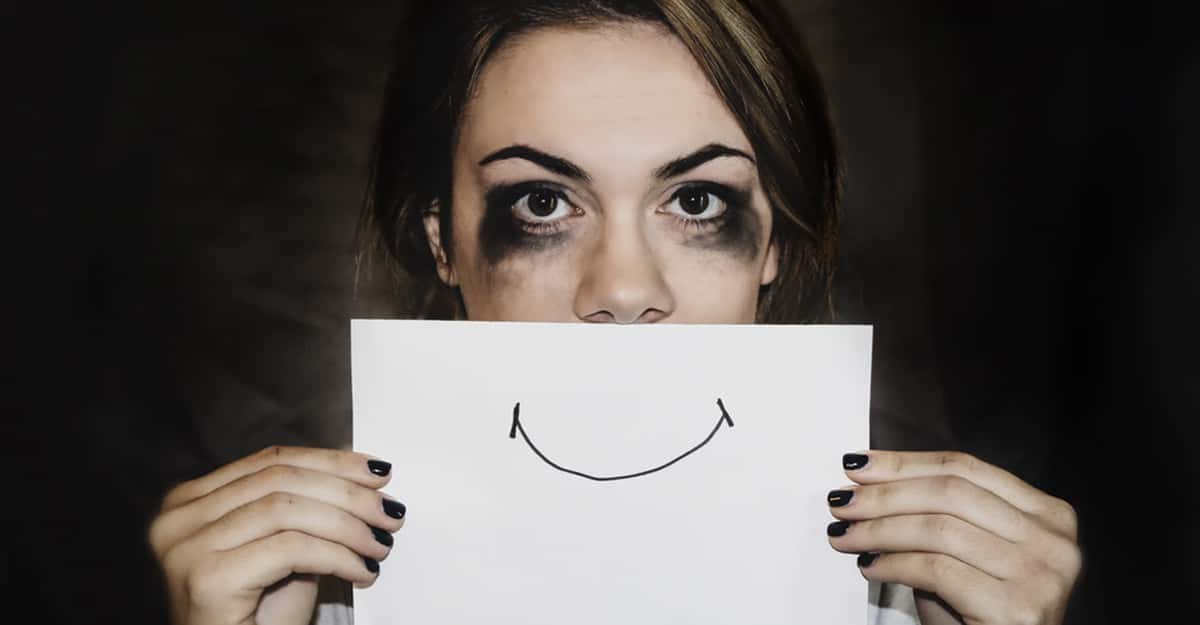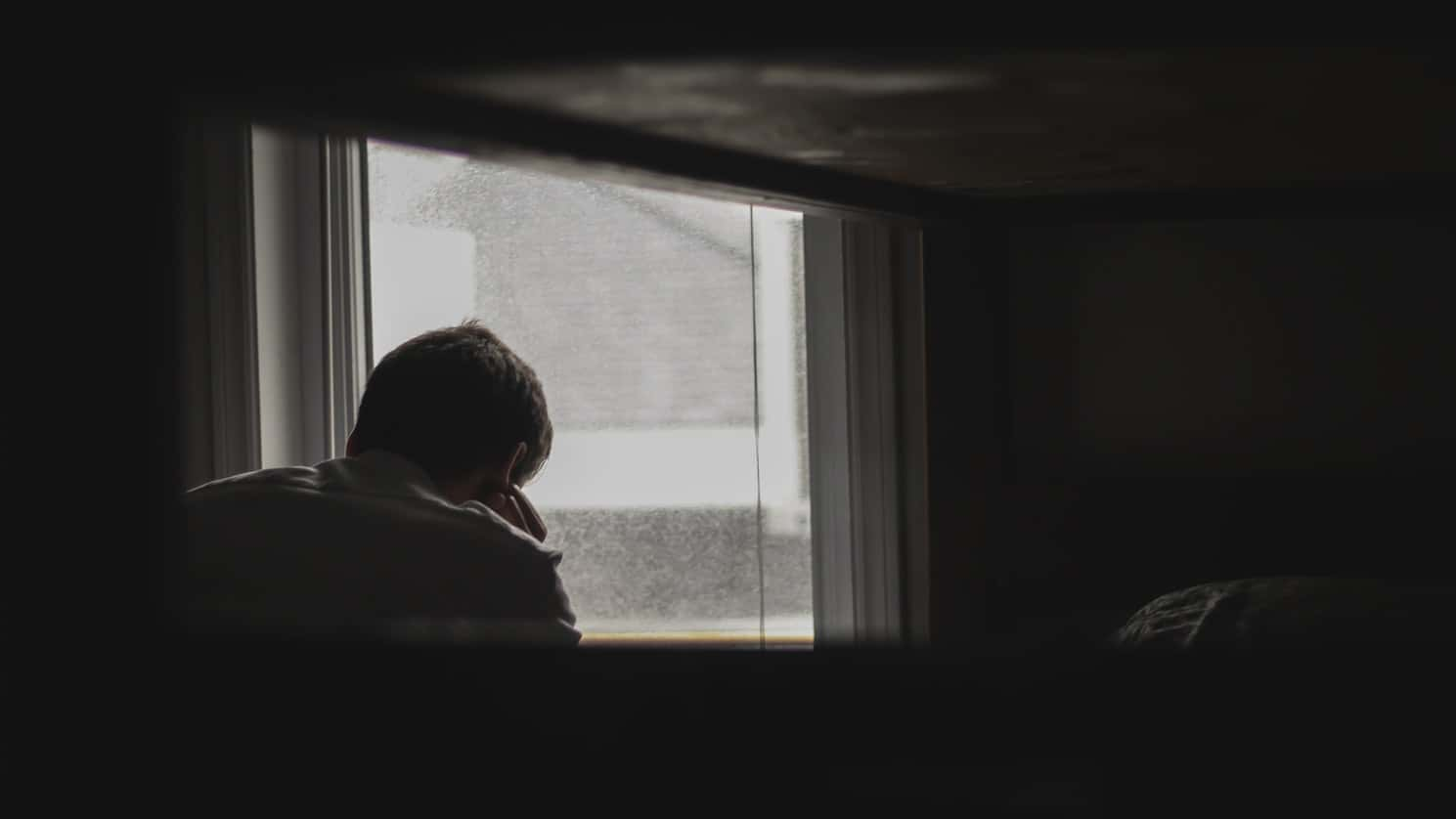Everyone experiences periods of ups and downs, sadness, stress, conflict, and anger, so when you're feeling off, it can be difficult to determine if you need to see a therapist. But it's important to know when your inner feelings and emotions have reached a level that requires attention.
Recent statistics from the National Alliance on Mental Health show that one out of every five American adults lives with a mental health condition, but only about 40 percent of people with mental health issues get help. Whether it's talk therapy, psychotherapy, cognitive behavioural therapy, counselling, or self-guided help, therapy can benefit anyone struggling with life changes, relationship or family problems, mood disorders, and general mental health concerns. But how do you know when it's time to seek help? These therapists, psychologists, councillors, and patients offer their advice.
Don't forget to check the comment section below the article for more interesting stories!
#1 Self-Talk
The inability to regulate your own emotions. Also, negative self-talk. we talk to ourselves way worse than any other person would.
#2 Impairment
A good rule of thumb as to whether a behavior or symptom should be checked out is the same we use to determine a diagnosable disorder: if it causes impairment in one or more areas of life. The range of what is normal is huge, but if something keeps you from going to school or work, keeps you from maintaining basic hygiene, keeps you from maintaining your friendship and familial relationships, it's causing impairment and you should seek help.
However, this is NOT an exhaustive criteria for diagnosable mental illness. There are many criteria we consider in diagnosing, but the one criteria that is present for all is that it must cause impairment. Enjoyment is also an important aspect of functioning. If you are getting by in your life but are miserable... Get help. You don't have to live like that.
The areas of functioning I listed are general examples pulled from the Western culture where I live and was trained. Different cultures have different values and the norms of your culture should be taken into account. If you are unbothered by your level of functioning in these areas relative to cultural expectations, good for you. Most people considering this advice likely have a sense that something is not where they want it to be in their life and are looking for confirmation that it's "bad enough" to seek help. If you're not concerned, my advice is not directed at you. No one is saying that being content with having no interpersonal connections is inherently pathological.
#3 These Three Symptoms
Thinking that five hours of sleep per night is okay. Rapid weight gain or loss with no obvious medical cause. Relationship problems.
#4 Check-In With Your Toddler
Research psychologist checking in: If your toddler is doing socially unusual behaviors such as:
- Not responding to name.
- Not responding to a social smile.
- Not pointing or using gestures.
- Using your hands or arms as if they were a tool or extension of their body.
- Engaging in repetitive behaviors.
- Not responding to your use of gaze to direct their attention to distal objects.
Check with the pediatrician about getting assessed for autism spectrum disorder.
#5 What's Your Relationship Like?
People normalize abusive behaviors by loved ones all the time. Being able to identify your own personal boundaries and then enforce them with others for your own wellbeing is, unfortunately, not innate.
#6 It's Not Your Job
Therapist here. If you grew up with or currently are a part of a family where the whole family has to work to keep one or more members of the family in a good mood or appeased, that’s not healthy. People are in charge of their own feelings. It is not your job to appease others so that they can emotionally regulate themselves.
#7 Shadow People
Shadow people. One question we, as therapists, asked was if they ever saw, heard, or smelled anything others didn't. This came up more often than you might think.
#8 Anxiety Signs
There have been a lot of my patients who have been pretty surprised when I’ve told them, “Hey, that’s anxiety/depression,” when they just thought their behaviors were typical for everyone.
- Not being able to maintain friendships.
- Constantly being nervous about the safety of your child, to the point where you hate being alone with your child without your partner.
- Not being able to motivate yourself to do things, especially things you once enjoyed.
- Feeling excessively tired all the time.
- Not being able to calm down and just thinking about the same thoughts over and over and feeling worried.
#9 Get Checked
From the patient side, it took having a massive anxiety attack at my doctor's office to find out that no, massive anxiety attacks in front of strangers aren't common or normal.
Sign Up For Our Newsletter
Stories that matter — delivered straight to your inbox.
#10 Self-Sabotaging Behavior
Self-sabotaging behavior can ruin your life quickly. If you have an event in your life that has affected you negatively and you seem to find yourself exhibiting irrational or incongruent behaviors, see a counselor. You don’t have to have any certain pathology to seek mental wellness counseling.
#11 Parent Behavior
The attitudes of parents. No, really. There are a lot of bad things that current parents do that are just seen as normal, when they're not. And they have long-lasting psychological effects from emotional damage.
#12 Therapy Is Not a Weakness
I’ve seen a lot of people dismiss their depression or other mental illness because it’s “not that bad” or “other people have it worse” or “I can/should be able to handle it on my own.” You shouldn’t have to suffer through mental illness even if you technically can. You deserve to be happy and therapists and psychiatrists are there to help you learn how to help yourself. It’s not a weakness to find someone who can assist you in figuring out coping skills or prescribe you medications to help fine-tune your brain’s neurotransmitters.
#13 Stress Is Key
Getting stressed every day. You'd be surprised how many people just say, "No, it's okay. My job is just stressful." Or other similar excuses. So many health issues arise from stress. Or prolonged unmotivation. Not wanting to do things.
#14 It's Not Your Kid's Fault
The need for some parents to speak with their children about adult problems. No, your young child does not need to be aware that you are struggling financially. And parents that feel they need their children "fixed" as if it's the child and not the family that needs support.
I'm currently working with a child now that is triggered whenever he hears talk about finances and feels it's his fault they will eventually become homeless. They won't, but this is what he is told. If only he didn't eat so much, if only he didn't have so many school fees. Not to mention the arguing between carers over finances. He thinks this must be his fault too as they're yelling and shouting because of this.
#15 Disassociating With Friends
Disassociating with friends. A current friend of mine is having real struggles emotionally and mentally. We’re still talking but he’s been distancing himself from other people. We reach breakthroughs every now and then, but it’s been difficult.
#16 Get Outside Help
School psychologist here. Begging, dragging, pulling, and fighting your child to go to school every day is not normal. It could be that it's too difficult or socially challenging. Most importantly, all mental health issues are able to be helped in the school. We have social workers, mental health counselors, psychologists, behavioral health workers, school and guidance counselors, social skills teachers, and more! We run groups, work on school avoidance, help build friendships, teach coping strategies, and calm kids down when they need it. Remember, the longer a kid avoids school... The harder it will be to get them back in. Don't give in but get them in and plan with the school. Get outside help if the task is too great.
#17 Draw the Line
From what my therapist told me, if you would simply rather be doing other stuff that's perfectly normal, but if you absolutely can not bring yourself to do homework then there's something wrong. I used to have severe anxiety attacks about homework to the point where when I needed to do it, I'd either be completely drained and go to sleep (regardless of time of day), or have a huge breakdown.
#18 Seek Help With:
Things we (therapists) can help with:
- Having a hard time trusting others.
- Trying to recover a relationship from infidelity.
- Not knowing why your kid is misbehaving so much and needing guidance.
- Helping to improve communication within your relationships.
#19 Common Problems
Psychotherapist here. Some things I see regularly that could have been caught earlier before they became a problem:
- Unhealthy coping mechanisms. For example, drinking "to relax" frequently or smoking a lot. Even something like promiscuity can be a red flag that a person is trying to avoid dealing with something stressful by distracting themselves.
- Self-harm. Hitting yourself, banging your head on things, burning yourself on purpose, etc. All of those things indicate that it's time to talk with a professional.
- "Normal" child/teen behaviors that are not actually normal, like running away or getting into fights.
#20 Dismissing Your Feelings
Dismissing your own feelings, your own thoughts, and your own internal voice saying “something isn’t right” because others around the world have it worse. Devaluing your thoughts and emotions is a quick path down to making them louder and more painful.
#21 Extreme Emotions
Extreme emotions, lack or struggle with impulse control, blackouts, extreme irritability, disrupted sleep, muted or bottled emotions, feeling like an alien, feeling like everyone has an ulterior motive, self-isolation, preoccupation with pleasing others or avoiding conflict, feeling of emptiness, feeling like a part of your identity is missing or that you don’t have an identity of your own, subtle tendencies to latch on to others (especially romantic partners).
#22 Emotional Regulation
Emotional regulation. I see typical kids that just can’t handle anything. It’s terrifying! They are going to have a very difficult journey ahead unless they seek help.
#23 Perfectionism
Perfectionism. While a spectrum and everyone wants to do good work, an obsession with perfection is not something to be proud of and definitely not healthy. Healthy work ethic is doing your best, and then letting go, as in recognizing no matter how much effort you put in, the result is, to some extent, out of your control, and that's okay. The intent and effort count more than the end result.
It is a fact of life sometimes things don't work out, so people who never, and I mean never, have anything less than flawless work all the time are paying for it: burnout or mental stress. It is pathological to want, or to think you can realistically have, such control that your work is flawless all the time.
#24 Bad Grades
Not a psychologist, therapist, or councilor, but this is something I wished people paid more attention to: going from straight As to Cs and Ds.
#25 Comparing Yourself
Most people are done for due to an overload of comparing themselves to others. This exists because of social media. It follows us. All day. Every day. I'm not a psychologist but this makes the most sense to me. I've never seen so many people feel so lost in my life before and this only has happened in the last five to six years as social media sites blew up in popularity.
#26 Anxiety
#27 Coping
I've been a couples therapist for 10 years and am now the clinical director of a private practice. Coping with stress in your relationships by walking away from conversations, saying you've had enough, or going silent. Coping with feelings of insecurity and anxiety by lashing out at your partner. For example, asking a bunch of questions about one of their acquaintances instead of saying, "I feel insecure for these reasons, please talk through it with me."
#28 Check This
Does your heart speed up when you lie down? Go to the doctor.
#29 Tired and Irritated
Unexplained fatigue. Increased irritability. Feeling empty. Having your body feel so heavy it is hard to walk. Cyclical thoughts. The belief that you should be perfect. Workaholism. Feeling insignificant and blaming it on having a pity party. Change in personality. Significantly decreased motivation. Feeling alone. Unrealistic expectations of self and others leading to upset. Poor sleep. Appetite disturbance. Heavy drinking. There is a huge list. As a society, we normalize the disturbances in the interest of social comparison.
#30 Normalizing
The biggest thing I've run into over and over again is people normalizing their negative and injurious behaviors. I've seen multiple clients go through what I'd call "bargaining" and say its only jokes, or just this one time, but they are in dire need of assistance.
#31 Not One-Size-Fits-All
Tech here, so bottom of the totem pole, but I'll offer my opinion. Normal is not the right qualifier in my opinion. Psychology isnt like physiology where you can go in and they can run exploratory tests on you to find out you are sick in a way that hasn't manifest symptoms yet. That's why your doctor will screen you for certain common or devastating disorders.
The way I learned about mental illness was the four D's: dysfunction, deviation, distress, and danger. Dysfunction means it gets in the way of you doing your job, school, or whatever. Deviation means it's not something everyone is going through. Distress means you're not okay with it. Danger is self-explanatory. You come in with some or all of the four d's and we form a treatment based on a set of symptoms that you most closely match. Then we treat the symptoms. The point of all of this is to say, mental illness exists on a spectrum where one end may be so subtle that it only informs a person's personality, whereas the other end is completely debilitating.
#32 Not Normal
I had a client tell me he had a normal amount of panic attacks a day... 15. I got him to describe them and they were full-on panic attacks. I had to explain that it was not normal.
#33 Communication and Mood Swings
Psychotherapist here.
- Not communicating. When this happens, something is usually wrong (not always, as some folks are quieter than others). But if a child/teen/adult rarely speaks or if they are silent in the presence of their parent or significant other, it's time to get them to see a professional ALONE to have their safety assessed. I've seen individuals who are literally shut down due to having been profoundly abused by the people they live with and one of the main signs of that is silence. I've also seen people in perfectly good homes who cannot communicate due to extreme anxiety and without professional help, it's hard for them to overcome this.
- Mood swings. When a person's moods change from one extreme to another fairly often/regularly that is another concerning symptom. Sometimes they are considered eccentric or hormonal, but that sort of thing can be a sign of many problems from bipolar disorder to post-traumatic stress disorder.
#34 Emotional Regulation
Excessive self-deprecation, avoidance of everyday situations, and an inability to regulate emotions. I think it is vitally important for everyone to seek therapy, despite how mentally healthy you are. Therapy tends to bring out issues that people don't realize they have, which helps them live healthier and happier lives.
#35 Too Much, Too Little
Let's look at some qualities you can have that are too extreme and what diagnosis that MAY relate to.
- Too much energy: mania; too little: depression
- Too much trust: borderline personality disorder; too little: paranoia, also bpd
- Too much self-esteem: narcissistic personality disorder; too little: depression
- Too much fear: anxiety; too little: mania
- Too much memory: trauma; too little: dementia, Alzheimer's, psychosis
- Too much interaction: hyperverbal; too little: isolation, catatonia
That is just to say that many different extremes of certain traits can be a symptom. However, you do have to make sure it is abnormal for that person. Not everyone who doesn't like people is clinically isolative. In the end, it's important to see a professional.
#36
Drinking behaviors. Either their own or those of loved ones. I won't speak to what's "normal," but it is definitely not ideal to:
- Polish off a bottle of wine or a six-pack every few days (to relax/unwind/deal with stress)
- Need a drink or nightcap in the evenings (can't fall asleep without it)
- Binge drink most weekends (even if you don't drink during the week)
#37 Don't Wait
Trauma reactions. They are very normal for the situation but are not healthy or easy to deal with without help. Our bodies and brains hoard survival responses so I see a lot of people struggling with unhealthy coping skills or habits that at one point kept them safe and helped them survive. This can range from large mood swings, emotional or physical disassociation, difficulty connecting with one's physical or emotional being, and difficulty identifying triggers.
I get a lot of childhood abuse survivors who have had issues in therapy before due to this. If your therapist goes in assuming you are able to connect with and name feelings, identify what is weighing on you, etc., they won't be very helpful. Also my normal therapy PSA is whenever possible, please don't wait. There is no such thing as an issue too small for therapy, but waiting can cause something to morph into a way bigger issue. I know for a variety of reasons that isn't always feasible but if you can, please do!
#38 Emotions
Poor emotion regulation where it interferes with relationships, your career, and/or academics.
#39 Anger Management
Rage and anger outbursts. I’m shocked by how much bad behavior during an adult tantrum is written off with little or no concern. “Oh that’s just how he gets when he gets mad. He’ll calm down.” No, adults should be able to regulate their anger anger handle it appropriately. Everyone gets angry. That is totally normal. But we shouldn’t find ourselves escalating so easily and responding in ways we later regret.
#40 Paranoia
Paranoia. Even if you’re not having auditory or visual hallucinations, paranoia can be the gateway to worse underlying issues.
#41 Postpartum Anxiety
I am a very specific psychologist (I am a research psychologist and my area is maternal-infant health) so I am not sure how helpful this is but: We truly do NOT have a great understanding about what a physiologically normal postpartum mental health experience is versus a pathological one, except on the extreme end.
So my advice is this: Some about of distress probably is normal (it's a huge life change, a huge physical toll, and a huge shift in hormones), but if that distress is DISTRESSING to you, there are likely many, many different strategies for helping alleviate it, including medication when indicated.
I would also say that postpartum anxiety is something that I actually tend to see are more commonly normalized and not diagnosed; chronic, persistent, debilitating worry about your infant is not normal, but frankly we have socialized it to be an indicator of "good" mothering, even if it decreases overall quality of life.
#42 Interrupting Your Life
Most people experience most things. It is when that "thing" interrupts your ability to function that it is considered an issue. So, for example, if you feel depressed, well, we all feel depressed, but does your depression actually keep you in bed? Prevent you from participating in the activities you were planning on going to?
#43 Exhaustion
Exhaustion. If you are too tired to get out of bed, or if you literally can't function during the day, even though you may not be consciously aware you are having emotional difficulties yet, your body is shutting you down and MAKING you pay attention to it. The same goes for aches, pains, recurring flus, etc. Get it checked!
#44 Learning Difficulties
I'm a school psychologist. When your child is in school and having difficulty with learning, remembering, and applying the information consistently. Everyone is expected to have challenging classes or subjects but failing repeatedly despite significant efforts might need different supports. Special education teachers can make magic happen!
When your child's behavior requires constant monitoring, extensive reinforcement, is dangerous or difficult to predict, harmful to others, explosive, or highly disruptive on a frequent basis. The school will likely be contacting you and you need to work with them for the best interest of your child. We have behavior analysts!
#45 Bullied
Being bullied. It's amazing the number of people who are afraid to come to work in the morning because of the actions of their co-workers and if the salary is good, they put up with it for years. I was the mentor for a department of 20 or so staff, all women, and they tortured one poor lady. It affected everything in her life; her health, her relationship, romance—everything.
This is not an exhaustive criterion for mental illness. If you or someone you know would like to know more about therapy or mental health, contact your nearest mental health organization or local mental health hotline.














































